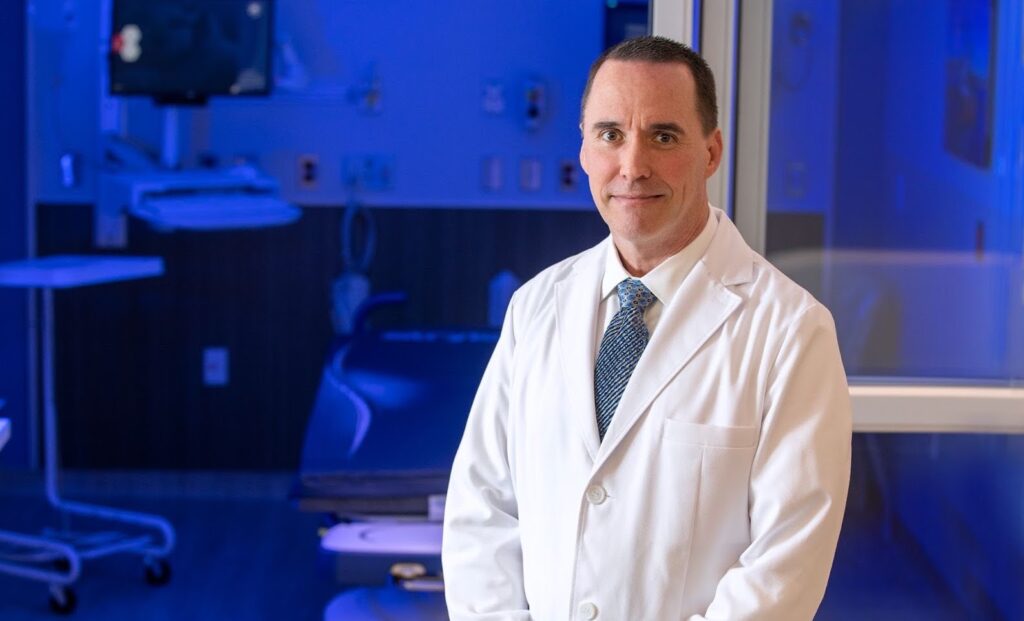In a career spanning over 30 years, James Leaming, MD, has worked as a physician, taught medical students and served in administrative roles in hospitals. Leaming has also earned a biomedical engineering degree and a doctorate in medicine to further his career, so he’s very experienced with intensely rigorous and demanding academic programs.
Now, as vice president of medical affairs and staff development at Penn State Health, Leaming wants to learn more about the business side of healthcare through the Online MBA in Healthcare Management at Case Western Reserve University.
Tell us about your professional background. What do you do?
I spent 25 years as a clinician, but in the past five to seven years, I have moved toward hospital administration roles and that’s where I found myself becoming interested in understanding a bit more about the business of healthcare and business in general.
There are several different types of administrators within the hospitals. In my job as chief medical officer (CMO), I oversee all the medical operations—from the onboarding of physicians to the review of the quality of care to the interactions with the community. I’m the second in command to the president of the hospital systems.
What motivated you to return to school for an MBA in healthcare management?
I was in an administrative role and needed a better understanding of the healthcare business. This was the right opportunity to get that education. The curriculum Case Western Reserve offered around the business was intriguing and the best fit for my interests.
I will always work in healthcare and be interested in trying to understand and shape its future. This MBA has provided me with a background in everything from budgetary limitations to the future of technologies that may impact healthcare to the pressures put on payers in the healthcare system.
What made you choose an online program?
Where I live is extremely rural, so there are zero universities near me. But Case Western Reserve offers an infrastructure that allows you to be very well-connected to the university through the online portions of your program in a way that gives you asynchronous and synchronous experiences with folks.
It’s been said in every one of my classes thus far that what we’re doing is exactly what students are doing in a live environment. We’re just doing it using the wonders of technology that allow learning at a distance.
Step into healthcare administration
Earn your healthcare MBA at Case Western Reserve
Do any projects or assignments you’ve worked on in your classes stand out as especially relevant to your work?
Our professors often give us opportunities to emphasize things from our work, so there have been several projects that apply within the clinical environment. For example, our operations course included a throughput and flow case study in which we tried to optimize appointment procedures for an orthopedic clinic.
Those kinds of things keep the lessons relevant, but by and large, Case Western Reserve does a really good job at not making the program myopic about healthcare. Business isn’t just healthcare, and understanding the overall breadth of industries is a valuable part of the program. They show you that what you do daily won’t just be about healthcare. It will be about bigger business opportunities in the future.
What is your experience with networking in the program?
The professors have done a really good job bringing in folks working in fields relevant to the topics we are studying, creating some great networking opportunities. I have had the chance to reach out to them and ask particular questions, let them understand my interest in what they do and get some insider information about relevant things.
They also have an awful lot of seminars with guest speakers that are open to online students as well. Those give you a chance to meet folks, exchange questions and create some connections if something comes to life.
Where do you see your career in five years? And how does this MBA contribute to your goals?
I’m near the terminal height of where I would like to go within my career and within hospital administration roles. The only other area I think I might stretch to that interests me, and where I believe this MBA will support me, is a systems role. There are some very large health systems out there that would benefit from somebody with both clinical experience and an understanding of the business of healthcare. That’s where the MBA will give me some opportunities, open up some doors and create some understanding of how I can help more systems grow toward the future of healthcare.
It’s a tough environment out there in healthcare right now. There are a lot of businesses that are healthcare-associated or healthcare-primary that are struggling. The margins are small, and the efforts are becoming more and more difficult. If you can be innovative and understand how to help shape the market, you will probably have more opportunities to do good things within the healthcare system.
What advice would you give to someone considering the healthcare MBA program at Case Western Reserve?
It’s a personal decision, of course, but if you believe you would benefit from being able to participate in conversations differently, understand budgets and understand how the business of medicine works, then this is exactly what you should do. It is absolutely the right path for someone who wants to grow, no matter where you are within the spectrum of your career.
